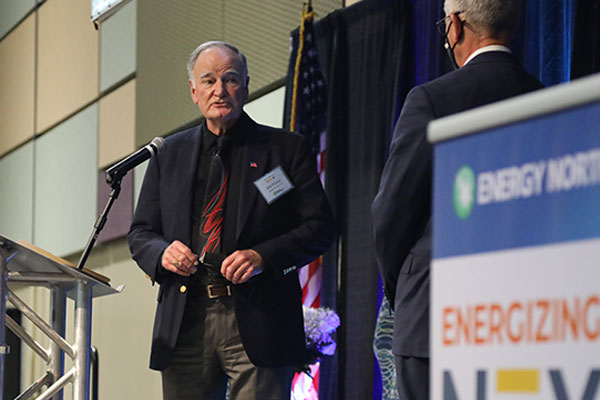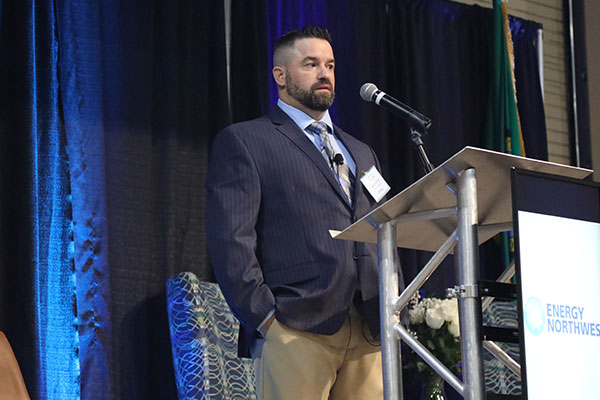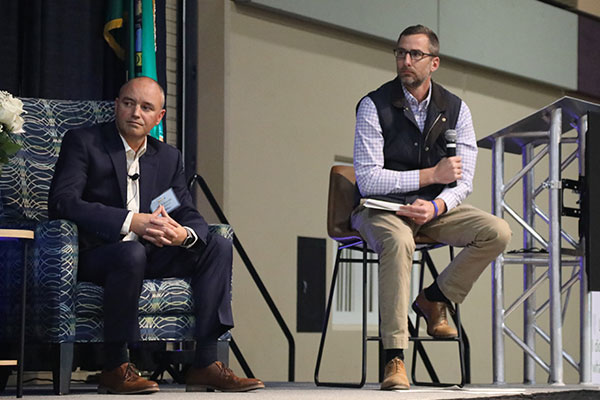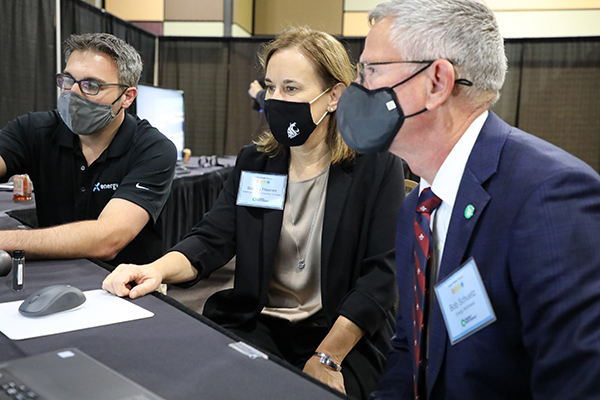(Above) Energy Northwest CEO Bob Schuetz (right) and Washington State University Tri-Cities Chancellor Sandra Haynes receive a tutorial of X-energy's Xe-100 reactor simulator from Travis Chapman, X-energy, during the Oct. 28 Public Power Forum.
More than 180 regional leaders came together last week to learn about the future of the power industry and how to be ready for it.
The 24th annual Energy Northwest Public Power Forum focused on "Energizing the Next Generation," with sessions on cybersecurity, the future workforce and new nuclear.
"Our goal is to turn forward-thinking ideas into practical solutions for Washington's clean energy future by meeting the many challenges we have," said EN Executive Board Chair Will Purser at the start of the forum. "From cybersecurity to workforce development to advancements in nuclear technology, Energy Northwest is diving into these big issues and exploring solutions."

Will Purser, executive board chair, introduces CEO Bob Schuetz during the Public Power Forum.
Next Generation Nuclear
A showpiece of the forum was an Xe-100 reactor simulator, provided by X-energy. The display included a virtual reality tour of what a completed X-energy plant would resemble. Forum attendees handled replicas of X-energy's TRISO particle fuel and saw how the reactor would operate.
X-energy CEO Clay Sell participated on the Next Generation Nuclear panel, along with Greg Cullen, Energy Services & Development vice president, and Grant PUD CEO Kevin Nordt.
X-energy was one of two companies awarded Advanced Reactor Demonstration Program (ARDP) funding by the Department of Energy. In April, EN, X-energy and Grant PUD formed the TRi Energy Partnership to work toward the development of an Xe-100 advanced nuclear power plant in Washington.
Xe-100 plants have a modular design, allowing them to scale up and add additional reactors to meet growing power demand. The plants are also based on a common design, allowing manufactured parts at scale rather than custom-built for each site, Sell explained. Another key selling point of the advanced plants and X-energy's fuel is safety.
"We start with a reactor that's intrinsically safe," Sell said. "It's physically impossible for that reactor to meltdown. That changes the way that you think about the system and results in a simplified design."
These factors combined make advanced nuclear an attractive option for utilities like Grant PUD, which has a long history of pursuing renewables and carbon-free energy, Nordt said.
While many think of the concepts in the advanced reactors as new, X-energy's reactor and proprietary fuel designs have a long history in the United States and have been tested for years.
"The X-energy technology has been around for decades," Cullen said. "We aren't talking about ideas that haven't been tested. All of the new nuclear technologies we are working with are evolutions of other technologies that have operated for decades."
Next Generation Cybersecurity
Attorney, cybersecurity expert and former FBI counterterrorism and counterintelligence operative Eric O'Neill gave the forum's keynote address. O'Neill is the author of "Gray Day," the true story of FBI mole Robert Hanssen, who was the first Russian cyber spy.
O'Neill challenged attendees to see cybersecurity threats not as hackers — anti-social teens in dark basements wearing black hoodies — but as spies — sophisticated criminals with an arsenal of espionage techniques at their disposal.
The darknet, where cyber criminals can buy and sell data, ransomware and other malicious software, is the third largest economy in the world today.
"Data is the currency of our lives," O'Neill said. "As we networked our lives, the spies had to evolve to steal that data wherever we had it."

Jason Davis, EN Information
Services, talks about current industry cybersecurity challenges.
During the COVID-19 pandemic, cyberattacks quadrupled, with more than $4 billion in losses. Public power, utilities and other critical infrastructure have become key targets for attacks.
Energy Northwest’s Jason Davis participated in a panel with Dean Kovacs, EN Information Services, Tim Arntzen, Port of Kennewick, and Chad Schow, Franklin PUD. Arntzen and Schow shared lessons they learned as victims of cyber breaches and how they've worked to strengthen their systems.
O'Neill and the panelists encouraged attendees to evaluate their network security before an attack hits, with a special eye for vulnerabilities.
"There's always this thought that it's going to happen to somebody else, then it happens to you," Arntzen said. "We got hit in November 2020. The thing you want to do as a manager is not get hit again. My advice is, whether you are a large or small company, know that it can happen to you."

At EN, the cyber security team frequently performs phishing tests to train users and empower them to protect the system.
Paul Dockery, (right)Clatskanie PUD and Jared Knode, Energy Services & Development, participate on a panel about the future power workforce.
Next Generation Workforce
In addition to new technologies and cyberthreats, public power companies also face new demands in the workforce. As record numbers of baby boomers retire, companies must change how they recruit young workers, many of whom aren't familiar with the opportunities available in the power industry.
This spring, EN's Energy Services & Development group launched the Public Power Internship program as a way to introduce college students to utility work. Jared Knode, ESD, talked about the pilot internship program and other ways to draw in new workers in a panel hosted by Paul Dockery, Clatskanie PUD, along with Sandra Haynes, Washington State University Tri-Cities chancellor; Marisa Keeney, Cowlitz PUD; and Jim Smith, Klickitat County PUD.
Reaching students at a young age is key, Keeney said.
"They don't realize that public power is so much more than the linemen keeping the lights on," Keeney said. “It takes engineers, accountants. There are many different career paths out there that many may not know about."
Connecting with students on social media and in person is important.
"This stuff is relational – students want to see somebody who has done it," Haynes said. "They want to see that this job is purposeful and meaningful."
The Public Power Forum is organized annually by Energy Northwest. Event sponsors were PFM, Bank of America Securities, J.P. Morgan, Baker Tilly, Wells Fargo, Foster Garvey and Orrick.
